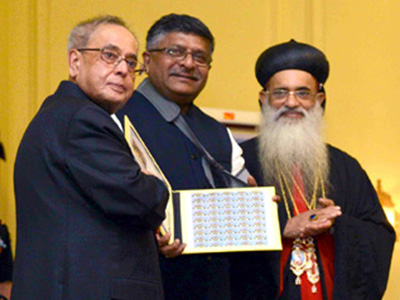
NEW DELHI, Apr 21: Noting that the Orthodox Church has made enduring contributions to the betterment of the life of the people of Kerala, President Pranab Mukherjee today said the role of the Church in spreading education cannot be ignored. Speaking after releasing a Postage Stamp commemorating the 200 years of the Orthodox Theological Seminary or Old Seminary, Kottayam, Kerala at Rashtrapati Bhavan, the President said, the Christian Community established a large chain of elementary schools throughout Kerala, under the supervision of the Seminary and its leaders. The Seminary was the first indigenous initiative towards universal literacy and education, which has today made Kerala the most literate state in the country.
The President said the charity and healthcare activities of the Syrian Church also originated in the Old Seminary under its leadership. It contributed to the improvement of the overall literacy in the state, created greater access to healthcare and empowerment of women leading to higher standards of living and quality of life in the state.
The role of the Church in healthcare, women’s empowerment and upliftment of the less privileged section of society are unparalleled, the President said. The President said for nearly 14 Centuries, the three major religions of Kerala, Hinduism, Christianity and Islam have existed in peace and harmony, respecting each other’s belief and cooperating to promote social welfare.
In fact, Kerala was the first state in the country in which both Christianity and Islam took roots with people voluntarily choosing different religious beliefs. The Old Seminary was set up by the Malankara Orthodox Church situated in Kerala, a state known for the peaceful co-existence of different religions and communal harmony. The Seminary and the Orthodox Church played their part in achieving this goal which led to the state realizing the complete separation of spiritualism and communalism. The lighting of oil lamps in and around Churches, the raising of the flagstaff and flags during festivals and the custom of entering the Churches barefoot are all Hindu traditions that have become a part of the Church practice. These bear testimony to the sharing of traditions by both the religions, the President said.
The President said it is not without reason that the Seminary has to its credit several firsts in the area of Human Development, apart from its contributions to the training and development of the clergy of the Church.
He said he was informed that the Cottayam College, which was co-located with the Seminary was the first English teaching institution in the state. The College taught, apart from Malayalam, Greek, Latin, Syriac, Hebrew and Sanskrit.
The first printing press was also established in the premises and scholars of the Seminary took active part in unifying and standardizing the common Malayalam Script. Benjamin Bailey along with Hermann Gundert, were among the pioneers of the development of modern Malayalam language and script.
To imagine that the first Malayalam Dictionary was developed and published by a Theological Seminary is a tribute to the commitment of the leaders of the Seminary and the Church itself to the overall development of Kerala. The credit of translating Bible into the first Indian language, Malayalam, also goes to the Seminary and College under the leadership of Benjamin Bayley, the President said.
The Orthodox Theological Seminary known as Old Seminary or Cottayam Syrian College is run by the Malankara Orthodox Syrian Church, the St. Thomas Christians. This is a heritage monument recognised by the Government for its importance as a two hundred year old quadrangular edifice where English education was started for the first time in Kerala. (UNI)

